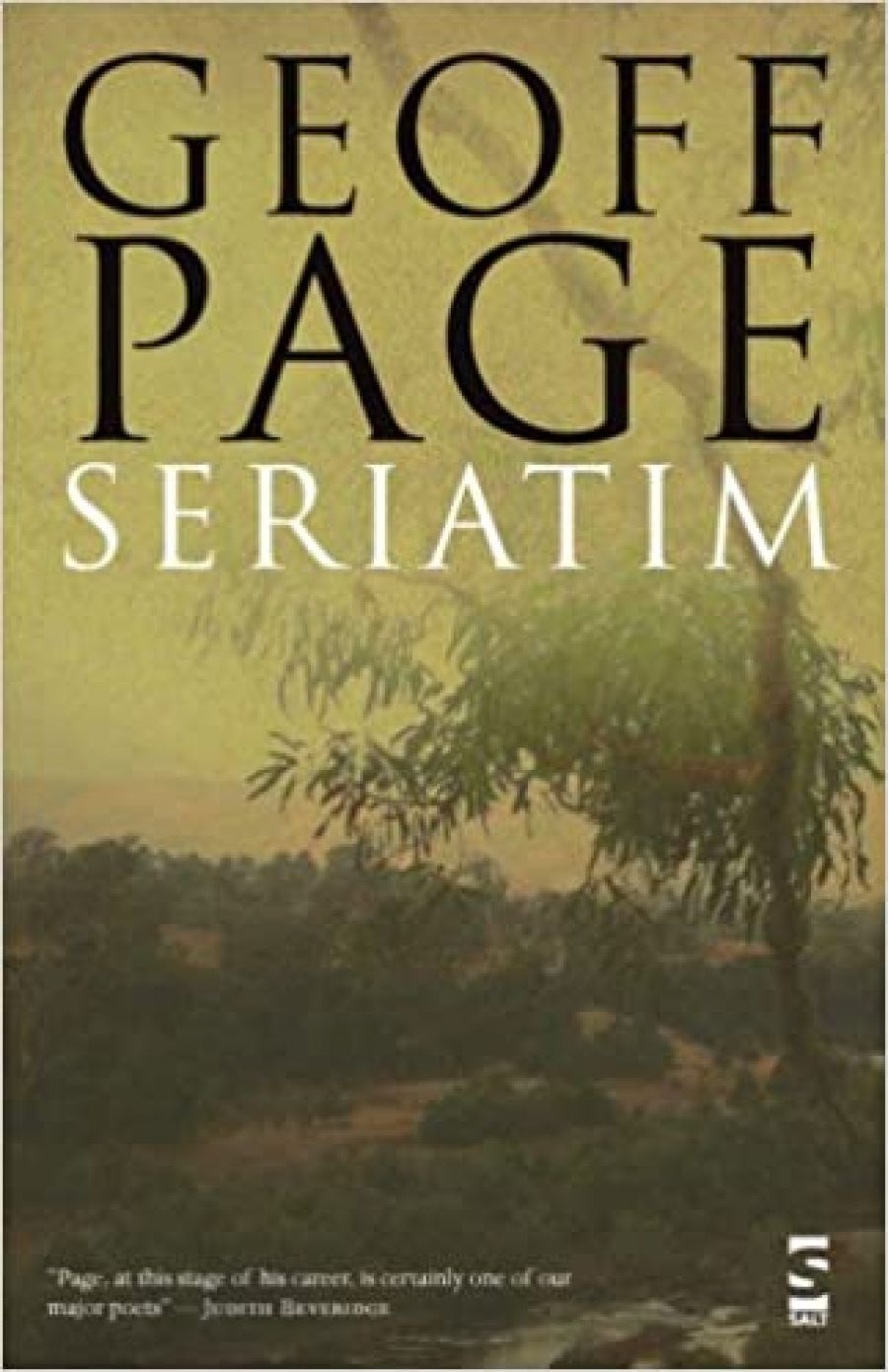
- Free Article: No
- Contents Category: Australian Poetry
- Review Article: Yes
- Article Title: Conversational Poetry
- Article Subtitle: Julian Croft reviews 'Seriatim' by Geoff Page
- Online Only: No
- Custom Highlight Text:
Seriatim, the poems are in order, though not subdivided into marked divisions indicating common themes with some compelling logic to them, but a series of observations, dot points, which may or may not be part of a larger argument. It is like a conversation. No one knows exactly where it will end when it starts, but it goes on with an order, sometimes determined by logic, otherwise by association, free and not so free. The book is one long poem; the poet’s consciousness explores ageing, place, time, poetry itself, language, and emotion, taking on whatever life throws up. So we start with reflections on Australian history, very old age (parents), old age (the poet himself), poetry and its practice, places here and abroad, and finally Islam and its extremists. It is a conversation between poet and reader in which there is no lofty conclusion, no stunning revelation or gesture, but a sharing of thought and emotion, which ends with the threads to be picked up later.
- Book 1 Title: Seriatim
- Book 1 Biblio: Salt Publishing, $24.95, 112 pp
Page has thought long and hard about poetry, its history and practice, and in these poems you can see, and more especially feel, the fruit of that labour. It is in the relaxed lines, their easy, fluent metrics, the catspaw movement of thought, the subtle shifts of emotion running through that thought like a line of counterpoint, and the whole presence and voice of the poet. This is quite an achievement. If you are looking for pyrotechnics, the unorthodox, or reconstituted prose, you won’t find it here. This is poetry of retirement and a relaxed meditation on life: good, moving poetry, but, some might say, not great poetry. As Page says in a poem on poetry, in this case a Random House anthology of US poetry, ‘I had not thought there were so many / good poets in the States. // I don’t say ‘Great’ – but who are we / to make such shrill demands?’
And that is because, ‘Not having any large intention / they track back through their lives / discovering the poignant’, producing poems which move their readers but will never attract a large following: ‘It is enough to know they’re there, / not braying through a huge PA // or prancing with a band / but simply noting how their lives // are very quietly passing – / and, also, other people’s.’
As one of Page’s generation, I can nod my head in agreement. But is senescence a popular subject? It certainly doesn’t compare with the roar of adolescence or the energy of young adulthood, and the envious glances at ‘the young in one another’s arms’, but it has its interests, as Yeats and Larkin and scores of others have shown over the years.
I would not want to give the impression that this is a collection of occasional, undemanding pieces. There are ambitious, and successful, meditations on the nature of dreams, on the psychological changes in ageing, on catastrophism, and on music (a long and productive interest in Page’s career). These poems are lucid, well-constructed essays with a fine attention to the fit of sound and thought. Page’s concern with the phonological qualities of his verse is one of its outstanding features. You can see how his mind and ear work together in a poem such as ‘2001’:
We will decide
Who comes to this country –
And the circumstances
In which they come.
How like a piece of poetry it was,
the roughening iambics,
those sharpened c’s, like angled pikes,
the two-beat lines that got us going –
except line 3 which had its extra
fist banged on the table …
Like most great poetry, of course,
it’s mainly made from echoes:
the glorious Three Hundred Greeks
who held Thermopylae
and Winston Churchill roaring still …
Or in a more serious and moving poem, one of many on religion and agnosticism, ‘Agnostic Angels’, the poet explores the title’s paradox in the rhythms of devotional verse: ‘The angels hang like satellites. / Their visit could be simply done – // and yet they don’t quite do it. / Hidden in the cumulus, / they wonder why they’ve come.’
Following this gentle scepticism, the last poems in the collection are angry reflections on Islamist extremism and on the perversions of suicidal martyrdom, in which the poet’s emotions unbalance the economy of his style (the poem ‘30 ml’), or achieve an uneasy balance with an austere classicism (‘Quattrocento’). While I admire the sentiment in these poems, they are still too contemporaneous to fit in with the tone of the whole collection.
Happily, I was more than charmed by the book. I thought it showed a poet at the height of his technical powers giving us insights into a stage of life more and more of us will enter. That’s by way of distancing myself in the small world of Australian poetry from Page’s apposite poem ‘Short Story’:
Auden said ‘We are too many’
but each book’s made of sweat.
You’re not a dry, cold-hearted man;
you think you won’t – and yet
you take the offer, type it up,
your less-than-charmed review –
while someone else, his friend perhaps,
is doing one on you.


Comments powered by CComment